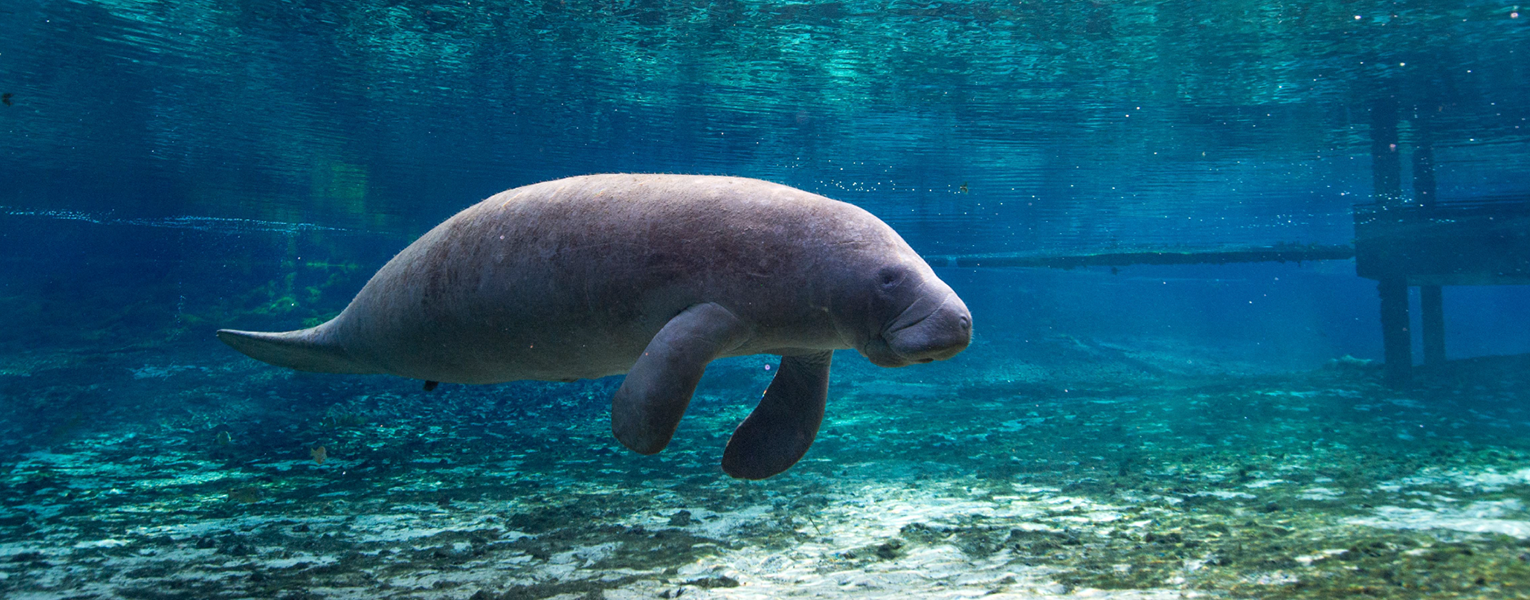9/2/2022
Saving Starving Manatees
Researchers Answer Sea Cows’ SOS
One of Florida’s most iconic marine mammals — the manatee — is in trouble. These gentle giants are starving. But FAU scientists are doing their part to help the manatees and their habitats.
In 2021, more than 1,000 manatees died in the state, mostly from starvation. This is nearly double the five-year average, according to a report from the Florida Fish and Wildlife Conservation Commission (FWC). The number of deaths is so unprecedented that the U.S. Fish and Wildlife Service (FWS) has classified the surge in deaths as an unusual mortality event, meaning that the issue demands immediate response.
Manatees inhabit the shallow rivers, bays, canals, estuaries and coastal areas of Florida, with seagrass an important part of their diet, along with other submerged aquatic vegetation. They can eat up to 15 percent of their body weight a day. A 1,000-pound manatee, for example, might eat 100 to 150 pounds of seagrass daily.
Poor water quality leading to harmful algal blooms has led to widespread seagrass die-offs, including in the Indian River Lagoon (IRL), a 156-mile-long estuary along the state’s east coast. FAU Harbor Branch Oceanographic Institute researcher Dennis Hanisak, Ph.D., is investigating the cause of this seagrass loss and contributing to important restoration efforts in the lagoon. He has more than 30 years of experience studying marine plants.
In a study published in Frontiers in Marine Science, Hanisak and his co-authors found that about 7,400 acres of seagrass were lost between 1943 and 1994. Another 58 percent was lost between 2011 and 2019. The loss was due to harmful algal blooms blocking out the available light for the plants to grow, Hanisak said.
To help with recovery efforts, Hanisak and his team are experimenting growing seagrass in large tanks and then transplanting it into the IRL. This seagrass nursery technology project recently received a grant from Florida Power & Light (FPL) through its charitable arm, the NextEra Energy Foundation Inc. The FWC is funding the expansion of the seagrass nursery while FPL is providing the funding to operate the nursery for at least three years.
While Hanisak grows seagrass to help the ecosystem, the manatees need help now. Although it’s illegal to feed manatees under regular circumstances, FWS and FWC began an experimental effort to supplement the malnourished mammals’ diets with lettuce and cabbage, according to FWC officials. The experimental feeding began in January in the warmer waters discharged from an FPL power plant near Cape Canaveral. During the winter months, manatees travel from the coast to warmer waters around the state, including the outflow from power plants.
In addition to supplementing the manatees with food, a multi-agency research effort is underway to study their body condition, and find and rescue critically ill manatees, using drones. The FAU HBOI Stranding and Population Assessment team, led by Steve Burton, will assist with this project by flying drones at the Harbor Branch basin and other locations where manatees gather.
“Our team members, Lydia Moreland, Brooke Davis and Shanen Cox, are Federal Aviation Administration certified drone pilots, and they will be flying weekly as needed, to collect video footage which will be submitted to the permit holders of the project for review,” Burton said. “Our team is honored to be participating in this research to understand more about this threatened marine mammal and their health during this trying time.”
Note of Collaborators
“The collaboration amongst a group of organizations, including Save the Manatee Club, University of Florida, Mote Marine Laboratory, Clearwater Marine Aquarium, Blue World Research Institute, New College of Florida, Hubbs-SeaWorld Research Institute, Florida International University, and more, allows for quality data collection and extensive geographic coverage,” Steve Burton said.
If you would like more information, please contact us at dorcommunications@fau.edu.
